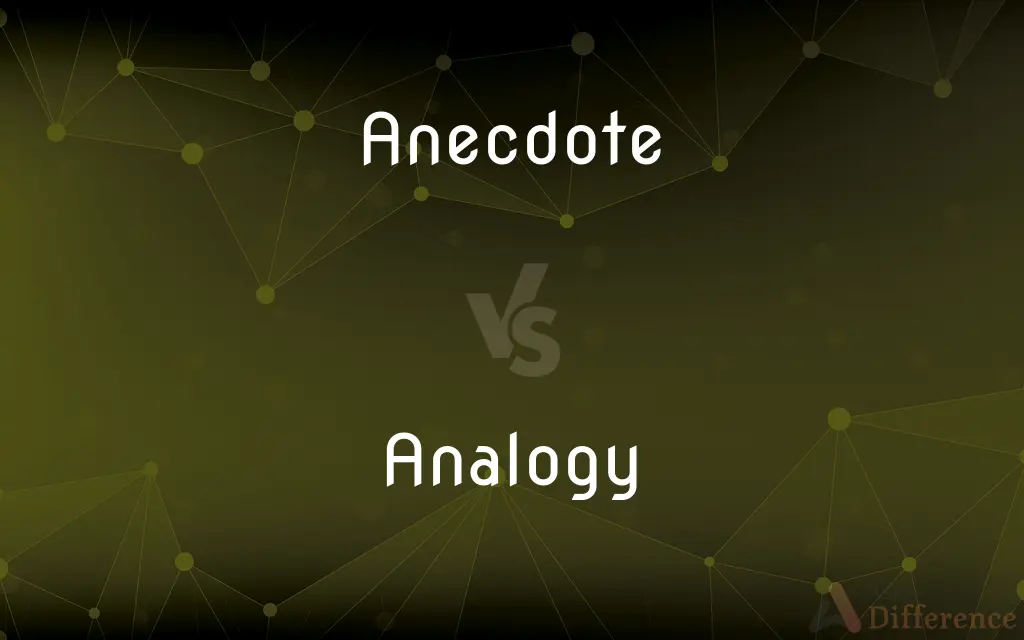Anecdote vs. Analogy — What's the Difference?
Edited by Tayyaba Rehman — By Urooj Arif — Updated on April 24, 2024
An anecdote is a short, amusing or interesting story about a real incident or person, often used to illustrate a point; an analogy, on the other hand, is a comparison between two different things that are similar in some way, typically used to explain.

Difference Between Anecdote and Analogy
Table of Contents
ADVERTISEMENT
Key Differences
An anecdote is typically a brief narrative involving real events or people, used to entertain or make a point during conversations or speeches. On the other hand, an analogy is a logical argument or reasoning tool that draws a comparison between two entities to highlight similarities in their relationships or structures.
Anecdotes are often personal and can serve as practical illustrations of an idea based on real-life experiences. Whereas analogies are more abstract, frequently employed in teaching or explaining where direct examples are not available.
The primary function of an anecdote is to engage the listener with a relatable or humorous situation, enhancing the speaker's message. On the other hand, an analogy aims to make complex ideas or concepts more understandable by linking them to something familiar.
While anecdotes are specific to actual events or personal experiences, analogies are versatile, often fabricated, and used to explain a wide range of topics, from simple to complex.
Anecdotes appeal to the emotions of the audience, making them memorable and impactful in storytelling. In contrast, analogies appeal to logical reasoning, helping to clarify and persuade through intellectual stimulation.
ADVERTISEMENT
Comparison Chart
Definition
A short, personal story
A comparison to explain similarity
Purpose
To entertain or illustrate a point
To clarify or explain
Nature
Personal and real
Abstract and conceptual
Usage
In narratives and speeches
In teaching and argumentation
Impact on Audience
Emotional engagement
Intellectual understanding
Compare with Definitions
Anecdote
A brief recounting of a funny or interesting event.
He told an anecdote about his first day at school to break the ice.
Analogy
Logical comparison used to support arguments.
She drew an analogy to past events to forecast future trends.
Anecdote
Short narrative derived from personal experience.
His anecdotes about the war were both harrowing and enlightening.
Analogy
A comparison to show similarity in some respects.
He used an analogy of a tree's branches to explain family genealogy.
Anecdote
An entertaining incident related to others.
The dinner was filled with anecdotes from their childhood.
Analogy
Educational tool to simplify complex concepts.
Her analogy between book chapters and life stages made the subject accessible.
Anecdote
A standalone snippet of life experience shared in conversation.
She shared an anecdote that perfectly illustrated the topic.
Analogy
A bridge for reasoning in discussions.
His analogy between a race and career progression was insightful.
Anecdote
Personal story used to illustrate a point.
Her anecdote about the taxi ride revealed the city's vibrant culture.
Analogy
Intellectual framework to connect different ideas.
The teacher's analogy helped students understand photosynthesis.
Anecdote
An anecdote is a brief, revealing account of an individual person or an incident: "a story with a point," such as to communicate an abstract idea about a person, place, or thing through the concrete details of a short narrative or to characterize by delineating a specific quirk or trait. Occasionally humorous, anecdotes differ from jokes because their primary purpose is not simply to provoke laughter but to reveal a truth more general than the brief tale itself.Anecdotes may be real or fictional; the anecdotal digression is a common feature of literary works and even oral anecdotes typically involve subtle exaggeration and dramatic shape designed to entertain the listener.
Analogy
A comparison between one thing and another, typically for the purpose of explanation or clarification
He interprets logical functions by analogy with machines
An analogy between the workings of nature and those of human societies
Anecdote
A short amusing or interesting story about a real incident or person
He told anecdotes about his job
Analogy
Analogy (from Greek ἀναλογία, analogia, "proportion", from ana- "upon, according to" [also "against", "anew"] + logos "ratio" [also "word, speech, reckoning"]) is a cognitive process of transferring information or meaning from a particular subject (the analog, or source) to another (the target), or a linguistic expression corresponding to such a process. In a narrower sense, analogy is an inference or an argument from one particular to another particular, as opposed to deduction, induction, and abduction, in which at least one of the premises, or the conclusion, is general rather than particular in nature.
Anecdote
A short account of an interesting or humorous incident.
Analogy
A similarity in some respects between things that are otherwise dissimilar
Sees an analogy between viral infection and the spread of ideas.
Anecdote
Pl. an·ec·dotes or an·ec·do·ta (-dōtə) Secret or hitherto undivulged particulars of history or biography.
Analogy
A comparison based on such similarity
Made an analogy between love and a fever.
Anecdote
A short account of a real incident or person, often humorous or interesting.
Tell an anecdote
Relate a short anecdote
Analogy
(Biology) Correspondence in function or position between organs of dissimilar evolutionary origin or structure.
Anecdote
An account which supports an argument, but which is not supported by scientific or statistical analysis.
Analogy
A form of reasoning based on the assumption that if two things are known to be alike in some respects, then they are probably alike in other respects.
Anecdote
A previously untold secret account of an incident.
Analogy
(Linguistics) The process by which words or morphemes are re-formed or created on the model of existing grammatical patterns in a language, often leading to greater regularity in paradigms, as evidenced by helped replacing holp and holpen as the past tense and past participle of help on the model of verbs such as yelp, yelped, yelped.
Anecdote
(ambitransitive) To tell anecdotes (about).
Analogy
A relationship of resemblance or equivalence between two situations, people, or objects, especially when used as a basis for explanation or extrapolation.
Anecdote
Unpublished narratives.
Analogy
(geometry) The proportion or the equality of ratios.
Anecdote
A particular or detached incident or fact of an interesting nature; a biographical incident or fragment; a single passage of private life.
Analogy
(grammar) The correspondence of a word or phrase with the genius of a language, as learned from the manner in which its words and phrases are ordinarily formed; similarity of derivative or inflectional processes.
Anecdote
Short account of an incident (especially a biographical one)
Analogy
A resemblance of relations; an agreement or likeness between things in some circumstances or effects, when the things are otherwise entirely different. Thus, learning enlightens the mind, because it is to the mind what light is to the eye, enabling it to discover things before hidden.
Analogy
A relation or correspondence in function, between organs or parts which are decidedly different.
Analogy
Proportion; equality of ratios.
Analogy
Conformity of words to the genius, structure, or general rules of a language; similarity of origin, inflection, or principle of pronunciation, and the like, as opposed to anomaly.
Analogy
An inference that if things agree in some respects they probably agree in others
Analogy
Drawing a comparison in order to show a similarity in some respect;
The operation of a computer presents and interesting analogy to the working of the brain
The models show by analogy how matter is built up
Analogy
The religious belief that between creature and creator no similarity can be found so great but that the dissimilarity is always greater; language can point in the right direction but any analogy between God and humans will always be inadequate
Common Curiosities
What is an analogy?
An analogy is a comparison between two different things for the purpose of explanation or clarification.
What is an anecdote?
An anecdote is a short and often amusing story about a real incident or person, typically used to illustrate or emphasize a point.
Can anecdotes be fictional?
Typically, anecdotes are based on true stories, but they may be embellished for effect.
Are all analogies based on similarities?
Yes, analogies highlight similarities between different concepts to explain or reason about them.
Is an analogy the same as a metaphor?
An analogy explains the relationship between concepts more extensively, while a metaphor is a direct figurative expression linking two unrelated things.
How do anecdotes function in communication?
Anecdotes function as engaging tools in communication, making stories relatable and memorable to the audience.
What is the primary purpose of using an analogy?
The primary purpose of an analogy is to make complex information more understandable by comparing it to something familiar.
Can an anecdote be a part of a larger narrative?
Yes, anecdotes can serve as illustrative examples within a larger narrative or argument.
What distinguishes an anecdote from a simple story?
Anecdotes are typically shorter and focused on a single incident, whereas stories may be more elaborate and detailed.
What makes an anecdote effective in speech?
An effective anecdote in speech is usually concise, relatable, and ties directly to the larger message or theme being discussed.
Can analogies be misleading?
Yes, if the comparison is not apt or the similarities are superficial, analogies can be misleading.
How do anecdotes enhance storytelling?
Anecdotes add a personal touch to storytelling, making narratives more engaging and emotionally resonant.
In what contexts are analogies most effectively used?
Analogies are most effective in educational and persuasive contexts where complex ideas need to be clarified.
How should analogies be constructed for clarity?
Analogies should be constructed with clear parallels and straightforward logic to ensure they enhance understanding and avoid confusion.
How do analogies aid in learning?
Analogies aid in learning by relating new and complex information to known experiences or concepts, facilitating easier understanding.
Share Your Discovery

Previous Comparison
Scow vs. Scowl
Next Comparison
Rambunctious vs. RumbustiousAuthor Spotlight
Written by
Urooj ArifUrooj is a skilled content writer at Ask Difference, known for her exceptional ability to simplify complex topics into engaging and informative content. With a passion for research and a flair for clear, concise writing, she consistently delivers articles that resonate with our diverse audience.
Edited by
Tayyaba RehmanTayyaba Rehman is a distinguished writer, currently serving as a primary contributor to askdifference.com. As a researcher in semantics and etymology, Tayyaba's passion for the complexity of languages and their distinctions has found a perfect home on the platform. Tayyaba delves into the intricacies of language, distinguishing between commonly confused words and phrases, thereby providing clarity for readers worldwide.














































